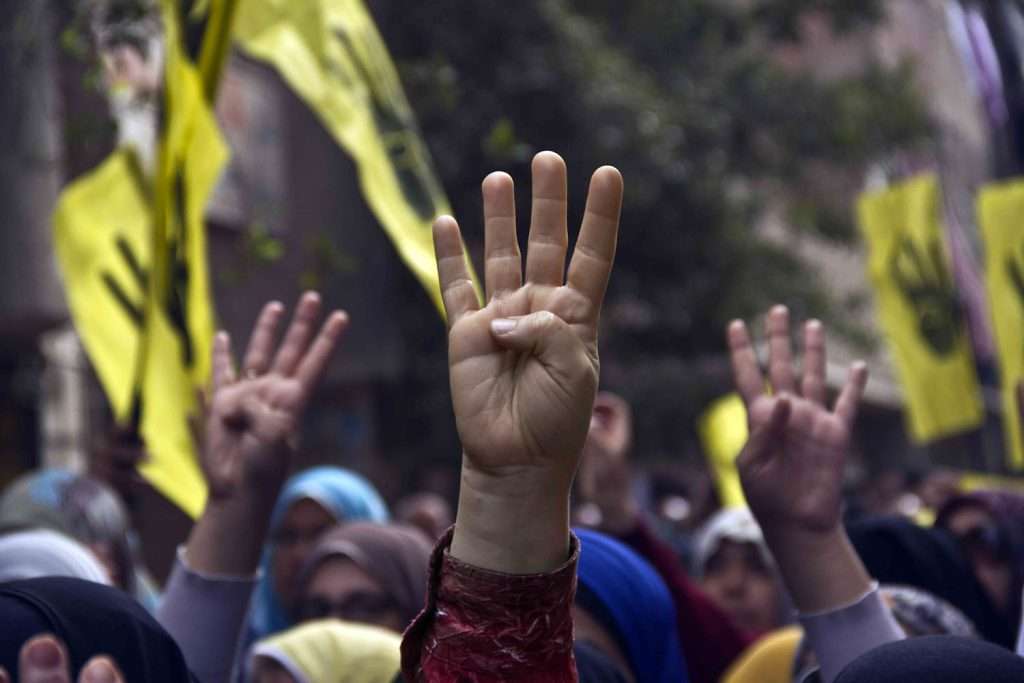Enforced disappearances rampant across MENA, rights groups say

Protesters raising the four finger sign during a march in Cairo, on the six month anniversary of the violent crackdown against supporters of ousted Egyptian President Mohamed Morsi, 2014
With the International Day of the Victims of Enforced Disappearances held on August 30th, rights groups have warned that these disappearances have become a “systematic tool of repression” across the Middle East and North Africa (MENA), according to The New Arab on August 31st.
International and regional organisations issued a joint statement, stating that the crime has a growing and profound impact on the human rights landscape of the Middle East and North Africa. They warned that it has become a widespread political weapon, sustained by impunity and weak rule of law, rather than isolated practices.
The UN General Assembly selected August 30th as the International Day of the Victims of Enforced Disappearances in 2010 to spread awareness of the issue, which is classified as the arrest or detention of a person by state agents or groups acting with national support, followed by a refusal to reveal their fate or location.

The UN considers enforced disappearance a serious human rights breach that may constitute a crime against humanity when it is extensive or systematic.
The statement specifically mentioned several Arab states in the broader MENA region as some of the worst-affected countries where state repression is not only growing but becoming more entrenched.
Egypt has seen almost 19,000 people forcibly disappeared since 2013, based on various estimates from rights groups, while the whereabouts of roughly 300 people remain unknown. The Egyptian Commission for Rights and Freedoms has recorded at least 4,253 incidents of enforced disappearances. A report by the Sinai Foundation for Human Rights and the Egyptian Front for Human Rights noted that detainees were victims of enforced disappearance and torture.
Akmal Qortam, leader of Egypt’s Conservative Party, called on the government to enact laws to prosecute those who hide enforced disappearances. “The spread of the phenomenon requires strong accountability to confront all cases of enforced disappearance that citizens are subjected to,” he said in a statement.
Algeria was highlighted as a country with a historical denial of justice, where thousands who went missing during the ‘Black Decade’ of the 1990s, have still not been accounted for. Algeria is still facing a severe crackdown on dissidents and journalists, especially following the #ManichRadi movement.
Iraq has faced years of deadly conflict with sectarian-based groups like ISIS, causing large numbers of people to disappear. This practice has seen an uptick following the recent crackdown by the Kurdistan Regional Government.
In Libya, enforced disappearances continue amid rivalries between armed groups and ongoing security issues. This is in line with a statement by the UN mission in Libya, which also condemned a broader pattern of disappearances for the International Day of the Victims of Enforced Disappearances.
Meanwhile, in Yemen, both the Houthis and the UAE-backed factions have been accused of running secret prisons to detain opponents.
Syria remains one of the most infamous countries for the crime, with rights groups estimating that roughly 100,000 individuals have disappeared under the former Assad regime. Rights groups say their fate remains uncertain, despite the country’s political changes, with a new Syrian transitional government having been formed after the regime.
For Gulf nations, the statement characterised the UAE and Saudi Arabia as projecting a “façade of development” that conceals injustice and human rights issues where individuals are detained for their beliefs or political views and are subjected to intimidation and repression. On June 14th, Saudi Arabia executed the anti-corruption and pro-women’s rights journalist, Turki al-Jasser, who was arbitrarily arrested in 2018, with rights campaigners claiming he was targeted for managing an X account that revealed political misconduct.
The rights groups have emphasised that enforced disappearance is a continuing crime that can amount to a crime against humanity. They have urged Arab governments, particularly those cited in the report, to ratify the International Convention for the Protection of All Persons from Enforced Disappearance, forming independent strategies to investigate cases, and ensure families their right to truth, justice, and redress.
The statement also urged foreign nations to apply adequate pressure on governments, back UN strategies, and initiate universal jurisdiction to prosecute those responsible.
“Silence over these crimes prolongs the suffering of victims and their families,” the statement said, adding that addressing enforced disappearance requires real political grit, independent justice, and more decisive global action.
The statement was signed by 10 global organisations; Justice for Human Rights, Victims of Torture Organisation, IFAV International, Alkarama for Human Rights, Human Rights Monitor, Cedar for Human Rights, Tawasol for Human Rights, Free Voice for Human Rights, Egyptian Rights Council and Solidarity for Human Rights.
The New Arab, Maghrebi.org
Want to chase the pulse of North Africa?
Subscribe to receive our FREE weekly PDF magazine













